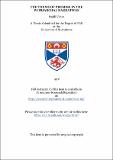Files in this item
The theme of promise in the patriarchal narratives
Item metadata
| dc.contributor.advisor | Martin, J. D. | |
| dc.contributor.author | Victor, Peddi | |
| dc.coverage.spatial | iii, iii, vi, 345 p. | en_US |
| dc.date.accessioned | 2018-06-06T09:05:39Z | |
| dc.date.available | 2018-06-06T09:05:39Z | |
| dc.date.issued | 1972-12 | |
| dc.identifier.uri | https://hdl.handle.net/10023/13747 | |
| dc.description.abstract | The scholarly discussion of the patriarchal narratives, initiated by Wellhausen in terms of the particularity of the religion of Israel, was given a new direction by Gunkel, who interpreted them in relation to a wider international culture. Gunkel focussed attention on the literary aspect of the patriarchal narratives and considered the theology in them to be the work of later, pious collectors and not an integral part of the narratives themselves. Alt, by examining the tradition-history of patriarchal religion, emphasized the importance of the theme of promise in the patriarchal narratives in relation to the cultural transition of the early pre-Israelite tribes from a nomadic culture to the sedentary culture of Canaan. Alt's thesis has been developed further from at least three different points of view: (i) Tradition history (Noth, Jepsen, Seebass and Hoftijzer), (ii) Literary formation (von Rad and Rost), and (iii) Pre-Israelite religion (Eissfeldt, Maag and Engnell). Bright, representing the American archaeological school (Albright and Wright), emphasizes the historicity of the patriarchs but does not sufficiently take into account the tradition-history of the patriarchal narratives and thus does not give much attention to the theme of promise in the patriarchal narratives. A new element is introduced into the discussion of the theme of 'promise' in the works of Zimraerli and Westermann. Zimmerli observes the five fold use of the root in Gen. 12, 1-3 and points out that here an unhistorical idea is historicized by the Yahwist. Westermann elaborates further upon this theme and emphasizes that the theme of promise has developed out of an original blessing-concept in the patriarchal narratives. An exegetical survey of the promise-blessing passages in the patriarchal narratives with a view to understanding their form and content, leads to two important conclusions: (a) There is a regular promise pattern in the patriarchal narratives in the form of 'command - promise - blessing'. These three elements represent three features of the religions and cultures in relation to which Israelite religion developed, namely, the nomadic religion of the 'gods of the fathers', the Canaanite El-religion and the Sinai-Exodus Yahwism. This promise pattern is very prominent in the Yahwist, but the element of blessing is either omitted or transformed by the Elohist because of his less enthusiastic attitude towards Canaan, its culture and religion. This promise pattern is also employed by P. (b) Promise and blessing are given in at least four different contexts: (i) strife, (ii) death of the father, (iii) marriage, and (iv) journey. Promise and blessing, given in these contexts are joined together to form a comprehensive promise complex, which is repeated again and again in the patriarchal narratives, although some of the promises do not correspond to the situation of need or tension narrated in the story. The development of the theme of promise in the patriarchal narratives may be understood in terms of the cultural transition of the pre-Israelite tribes from a nomadic culture to a sedentary culture, and a corresponding transition from a religion in which God is related to a people, to a religion in which God is bound to a place, Nomadic religion is a religion of promise, while the religion of a sedentary people is associated with the idea of blessing. Both of these religions had positive elements and also their own limitations. A combination of these two with Yahwism, a religion associated with divine, command, led to a lessening of limitations in the three of them and to a development of their positive ideas, in the present patriarchal narratives. The theme of promise could also be regarded as developing within the historical circumstances of Israel in the periods during which J, E and P are thought to have been written, that is the Davidic-Solomonic period, the reign of Rehoboam I and the Exile. Faced with the problems relating to cultural confrontation, these writers went back to the patriarchal traditions and reinterpreted them for their contemporaries, because they looked upon the patriarchal traditions as the first experience of the people of God in their encounter with other religions and cultures. These different authors have left their marks upon the theology of the patriarchal narratives. The three main elements of the promise pattern 'command - promise - blessing', have influenced each other and have thereby developed a new understanding of the God of Israel. | en_US |
| dc.language.iso | en | en_US |
| dc.publisher | University of St Andrews | |
| dc.subject.lcc | BS573.V5 | en |
| dc.subject.lcsh | Patriarchs (Bible) | en |
| dc.title | The theme of promise in the patriarchal narratives | en_US |
| dc.type | Thesis | en_US |
| dc.type.qualificationlevel | Doctoral | en_US |
| dc.type.qualificationname | PhD Doctor of Philosophy | en_US |
| dc.publisher.institution | The University of St Andrews | en_US |
This item appears in the following Collection(s)
Items in the St Andrews Research Repository are protected by copyright, with all rights reserved, unless otherwise indicated.

